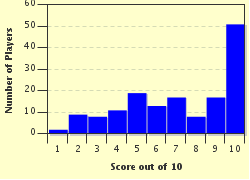Quiz Answer Key and Fun Facts
1. According to Alfred, Lord Tennyson, 'In the Spring a young man's fancy lightly turns to __ __ __.'
Which of the following phrases completes that quotation?
2. Can you find the missing word in this excerpt from a poem by Thomas Nashe?
'Spring, the sweet Spring, is the year's pleasant ___.'
3. In one of his sonnets, Shakespeare wondered if he should compare his loved-one to a summer's day and, after several lines of comparison, went on to write, 'But thy eternal summer shall not ___.'
What word has been left out at the end of that quotation?
4. You might need the children to help you with this one. According to a nursery rhyme, one summer's day the Queen of Hearts made some tarts. She must have been very cross when they were stolen. Do you know who the thief was?
5. This extract, in praise of summer, is taken from a 13th century poem. Do you know who wrote it?
'Sumer is icumen in;
Lhude sing cuccu.
Groweth sed and bloweth med
And springeth the wude nu.'
6. Which very well-known 19th century poet wrote an ode to autumn which begins with these words?
'Season of mists and mellow fruitfulness,
Close bosom-friend of the maturing sun.
Conspiring with him how to load and bless
With fruit the vines that round the thatch-eaves run.'
7. There is a word missing from the following extract from a poem by Thomas Hood. Can you find the correct, missing word?
'I saw old Autumn in the misty ___
Stand shadowless like Silence listening
To silence.'
8. This extract is from 'The Song of Solomon' (in the King James Version of the Bible). A lover calls to his beloved to enjoy the pleasures of the springtime with him. Which word have I left out?
'Rise up, my love , my ___ one, and come away.
For, lo, the winter is past, the rain is over and gone;
The flowers appear on the earth; the time of the singing of birds is come,
And the voice of the turtle is heard in our land.'
9. William Shakespeare is remembered mainly for his plays and sonnets, but he also wrote other poems. He must have been feeling a bit out-of-sorts when he wrote a poem called 'Bitter Song'. Here are the first three lines:
'Blow, ___, thou winter wind,
Thou art not so unkind
As man's ingratitude.'
What word is missing from this quotation?
10. 'Ode to the West Wind' was written by a very well-known nineteenth century poet. It's a long poem which ends with the following, rhyming couplet.
'The trumpet of a prophecy! O wind,
If Winter comes can Spring be far behind?'
Can you name the poet who wrote this ode?
Source: Author
Jomarion
This quiz was reviewed by FunTrivia editor
looney_tunes before going online.
Any errors found in FunTrivia content are routinely corrected through our feedback system.

